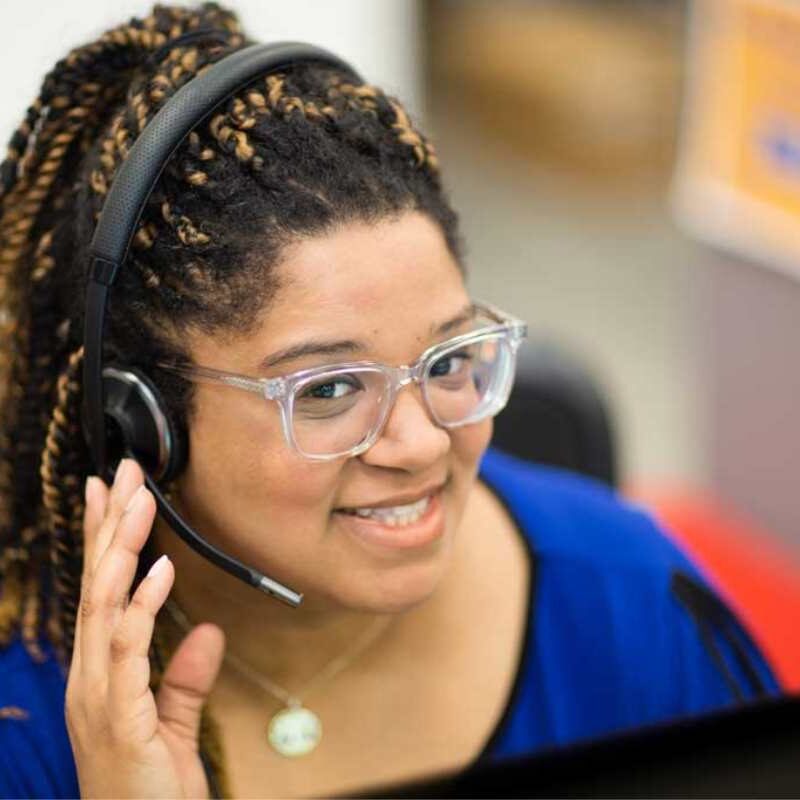
Support for Children and Families
Together, we can help Maryland's children thrive! Whether you're a parent, grandparent, caregiver, or kinship family, 211 is here to connect you to community supports.
Whether it's help with the children in your care or with essential needs, we're stronger as a community when we all have what we need to be well.


Find Resources for Children and Families
Quickly find help nearby by using these common resource searches for children and families. Filter searches by ZIP code in the 211 Community Resource Database.
Connecting Grown-Ups
Find community information and resources by choosing a category below.
Benefit Programs
Benefit Programs
Families must have access to essential needs like food, housing, clothing, and diapers. These are not just everyday needs; they also help support a child's healthy development. At 211, we connect families to the essentials, whether that's a food pantry or an assistance program for rent or utility bills.
myMDTHINK Benefits
Benefits are available from the state for help with food, utilities, or cash assistance. myMDTHINK is Maryland’s one-stop gateway to public health and human services. It's now quicker and easier to find resources that support community resilience.
Check eligibility by answering a few questions about your household - people, income/assets and living expenses.
![]()
![]()
![]()
Check Eligibility | Apply for Benefits
Applications for other benefit programs that support children and families are submitted separately.
Apply for other benefits
Learn about applying for benefits through:
![]()
WIC - food and nutrition support for pregnant women, new moms and children
![]()
Maryland Health Connection - health insurance
Find Child Care
Through the LOCATE: Child Care program, the Maryland Family Network connects families to child care providers and financial assistance for those who qualify. It's a free and confidential program.
LOCATE: Child Care is a free service that can help parents find child care providers including:
- center-based care facilities
- private Kindergarten
- private nursery schools
- Head Start
- special needs services
- school-age and after-school programs
The organization also has Family Resource Specialists who can help with applications for the child care scholarship.
A child care scholarship may also be available to help offset costs.
Call LOCATE Monday-Friday from 8:30 a.m. to 4 p.m. Call 1-877-261-0060
Special needs families can call 1-800-999-0120.

Paying for Child Care With A Scholarship
The Child Care Scholarship (CCS) Program helps eligible families pay for child care and early education programs. You may also know it by names such as the Child Care Subsidy, Purchase of Care Voucher or Subsidy Voucher.
CCS provides a yearly voucher. Families may also be required to pay a co-payment of between $0 and $3 per week or additional fees to cover the child's tuition.
Scholarships are available to eligible families with:
- a child younger than 13 years old, or
- an individual 13-19 years old with a qualifying disability
View an eligibility checklist and answer a series of yes and no questions to find out if you qualify for the scholarship. Also view the latest income guidelines from the Maryland State Department of Education.
Applications are completed through the Child Care Scholarship Family Portal and require documentation. Completed applications are processed within three business days.
Working Parents Assistance (WPA) Program
There may be additional resources available through your county as well. For example, the Working Parents Assistance Program (WPA) is a private-public fund run by volunteers that provides child care subsidies to eligible families in Montgomery County.
The WPA program offers a slightly higher maximum income qualification, enabling more people to qualify for financial support. The Montgomery County Government website details the Working Parents Assistance Program and the eligibility guidelines.
If you're ready to apply, fill out an application for WPA in English or in Spanish.
Find Resources for Children and Families
Quickly find help nearby by using these common resource searches for children and families. Filter searches by ZIP code in the 211 Community Resource Database.
Child Development
In the earliest stages of life, a child's brain is rapidly developing. While the brains of teens and adolescents are built on a foundation laid in early childhood, they are still under construction in later years. Each stage presents an opportunity for the learning and skills that follow. Together, we can promote healthy child development by paying attention to the contexts, environments, and conditions that support healthy development.
Helping Children Develop
Each developmental stage presents opportunities to make a difference in our children's lives so they can thrive.
We are committed to helping Maryland families. The Maryland Information Network, which powers 211 services in Maryland, is a backbone organization with Maryland Essentials for Childhood. That's a statewide initiative to prevent adverse childhood experiences and promotes positive ones.
They connect science, policy, and people with:
- Tools for grown-ups like the Brain-Building Toolkit.
- Connecting grown-ups to community support through the resource database we power.
- Advocating for policies that help families.
Ensuring grown-ups are connected to community supports can help children thrive!
We all play a role in supporting childhood development - if we think about resilience as a scale where positive experiences get stacked on to counterbalance negative ones, we can see that this is not just a job for parents and caregivers. Grown-ups throughout the community can make a difference.
Vroom makes learning fun
Vroom is a great tool to help grown-ups make learning fun for children ages 0-5. Parenting tips make learning part of playtime, mealtime, bedtime, and any other time of day.
You don't need special toys or gadgets. Interaction is the most important factor in helping children's brains develop.
Tracking Milestones
The Maryland Infants and Toddlers program helps parents and caregivers support children in reaching milestones and developmental goals by breaking down what you can expect at every age. With their milestone chart, select a child's age and quickly view the developmental milestones and red flags to watch for.
Early Intervention
If you suspect a developmental delay with speech, walking, eating or something else, talk to your pediatrician.
Early intervention services help children have a better chance of reaching their full potential. The earlier the services begin, the better. More than 68% of children who received early intervention services in Maryland were in general education classes by third grade, according to Maryland Infants and Toddlers.
Maryland Infants and Toddlers
For questions about a child’s development or a suspected delay for a child under three years old, request a free evaluation from the Maryland Infants and Toddlers Program.
If the child's delay is greater than 25% in one or more areas, the child demonstrates atypical development or behavior or has a qualifying diagnosed condition, they may be eligible for the free early intervention program.
The early intervention program can provide services for children until three years of age. These services may include:
- speech/language services
- physical therapy
- occupational therapy
How to request early intervention help
Parents and caregivers can refer their children to the Maryland Infants & Toddlers early intervention program, or may be referred by a health or education provider, child care or social service provider or a staff member from the NICU or hospital.
Request an evaluation by:
- Creating an account with Maryland Infants and Toddlers
- Using your account access to complete a referral
The referral may lead to an evaluation and services for those who qualify.
For questions, call a local Infants and Toddlers program, located in counties throughout the state. You may find the office in the Health Department, public school system, Health and Human Services Office or Board of Education.
School-Aged Support
Once your child reaches age 3, they move on to another program that works with the public school system to provide additional support for children ages 3 through 21.
Starting in preschool, children can get help with an educational disability or related service.
Child Find
In Maryland, Child Find offers preschool through high school programs, often working with the local public school system to support children.
There are programs for:
- autism
- deafness
- blindness
- speech or language impairment
- traumatic brain injury
- emotional disability
- intellectual impairment
- developmental delays
See the full eligibility list.
Find one of these programs by searching for Child Find in our statewide resource database or by calling one of the local providers on this list from Maryland Public Schools.
Additional Help
211 provides additional support for children with disabilities, for child social and emotional growth, and teen metal health. If you need help navigating your child's disability, connect with help.

Dial 211
Talk to a caring and compassionate person 24/7. They can also connect you to resources.
Parent and Caregiver Support
All parents and caregivers want their children to thrive, but it's not always easy. All of us need help from time to time along the way, and the community has your back! It takes all of us working together to raise resilient children.
The Family Tree's 24-hour Parenting Helpline is a free and confidential way to get parent and caregiver support. They provide confidential advice and community resources.
Parenting HelpLine:
1-800-243-7377
The Family Tree provides a free and confidential 24-hour parenting helpline in Maryland.
Kinship Caregiver Support
There are also support programs for caregivers, whether through the kinship program or foster care. If you're caring for someone else's child in your home 24/7, you may be a kinship family and not know it. You may qualify for benefits and support through Maryland's kinship programs.
211 also has a texting program that connects you to resources and support.
To receive informational messages about kinship.
By texting MDKinCares to 898-211, I agree to receive recurring automated messages.
You can also learn about parenting classes, strengthening the parent-child relationship and creating positive childhood experiences on 211's parenting support page.
Preventing Child Abuse and Neglect
When families are overloaded with stress, the ability to care for children’s needs can break down. Dial 211 and speak to someone if you or someone you know needs support.
When caregivers can’t or don’t attend to children’s physical and emotional needs, the effects can be serious and long-lasting.
When neglect occurs, children miss out on essential building blocks of health and well-being.
When children face prolonged harsh physical punishment or other forms of abuse, and don't have the supports to buffer this exposure, it can cause a “toxic stress” response that negatively affects a child’s brain, body and behaviors.
We can prevent child abuse and neglect by supporting our families to meet children’s needs. Support is available for families and for children who have experienced the adversity of neglect or abuse.
Reporting Potential Mistreatment
We all have a role in making sure that children are safe, free from abuse or neglect.
Watch this video from the Maryland Department of Human Services to learn more about the signs of child abuse and neglect.
CPS PSA Know the signs from DHS Communications on Vimeo.
Community members who suspect potential child abuse or neglect can share concerns with law enforcement or a local social service agency.
To make a report, find the Children’s Protective Services agency near you. Reports can be anonymous.
Additional Information for Families
Where To Go For Parenting Support In Maryland
Do you ever struggle with knowing what your child wants, why they won’t listen or how to respond to a temper tantrum? You don’t have to do it alone. It takes the entire community to help children become resilient. You’ve come to the right place if you’re looking for parenting support and resources in Maryland.…
Maryland Kinship Care 101: What It Is And How It Helps
Caring for a relative’s child or family by choice (non-relative) makes a difference! Even if it’s an informal arrangement, this 24/7 care is kinship care when family or a non-relative steps in to help during a parental hardship. This guide to kinship care helps Marylanders understand kinship care and the benefits available. Many families are…
Kinship Navigation: How To Find Support and Overcome Challenges
Kinship care provides stability, safety, and support for children in a familiar environment. In Maryland, kinship navigation services can help families access benefits and support and manage any challenges. Search for kinship navigation programs, or continue reading about ways to get support. Search for kinship navigation programs How kinship works | Get help navigating kinship |…
Summer Camps, Programs and Food Support for Children
Are you wondering how to keep your child busy while they are on summer break? There are free or low-cost recreation programs available in your area. Many local parks and recreation departments and organizations provide programs and camps to keep children active during the summer in a fun and engaging way. Find a Maryland summer…
How Maryland WIC Helps Women, Infants and Children with Food
WIC provides food vouchers to eligible moms-to-be, new moms who are nursing, and children up to age 5. Learn about eligibility and get connected to this food program and others. Get Started WIC Maryland Maryland WIC offers food vouchers, nutrition education, and breastfeeding support. The assistance program focuses on better nutrition and a brighter future for…
Safe Haven: Help for New Parents Who Can’t Care for a Child
Help is available for pregnant individuals or those who have recently had a baby and are not ready to be a parent or start a family. What is Safe Haven? Safe Haven provides a legal and safe alternative for parents to anonymously hand over an unharmed baby up to 60 days old. There are no…
Having A Baby
Welcoming a new baby is an exciting time. It’s also a big change and a lot to navigate. From prenatal care and nutrition to emotional support and baby essentials, 211 connects caregivers and parents to community supports for pregnancy, postpartum, and the early years of the baby’s life. Start your search by picking up the…
explore assistance programs
Learn about benefit programs and how to connect with support.
explore assistance programs
Learn about benefit programs and how to connect with support.











